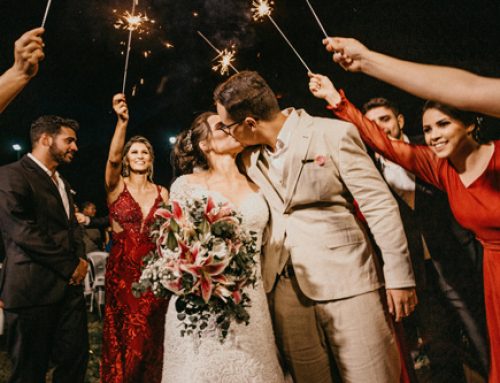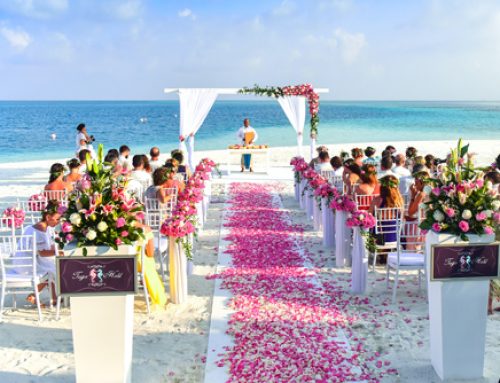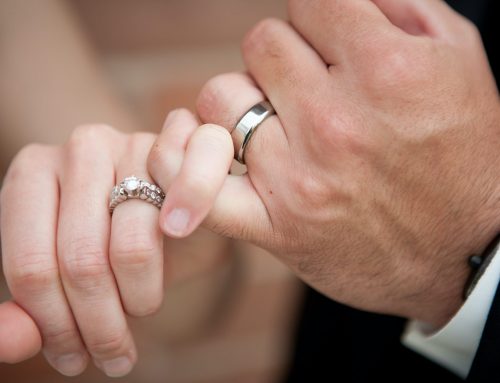After getting engaged, one of the first decisions to be made revolves around setting the date. Multiple factors should be accounted for to ensure that you, your partner, and your budget are all taken into consideration. While there’s no universal “best time” to get married, by reviewing the information below, you’ll be able to decide on a date that is best for you.
What Is the Best Month to Get Married?
Every bride and groom may have their own ideal conditions they envision when thinking about their wedding day, so having conversations with your soon-to-be spouse about what season they have in mind is important. The following months are known as peak wedding season — they are the most popular, and are typically in the highest demand. Additionally, it is important to note that while these months may come in high demand for good reason (weather, availability of fresh flowers and food, etc.), they tend to be on the pricier side when it comes to venues and vendors due to the competition.

- May: The sayings “April showers bring May flowers”, and “spring is in the air” capture the romantic feelings of rebirth, renewal, and freshness that spring can bring. Many couples find this season of “new beginnings” to be the perfect time to start their lives together. May is the first month in what is known as “peak wedding season” and it deserves to be — the weather is warmer, but typically not too hot, and plenty of fresh and delicate spring flowers are finally available after the long winter months
- June: The end of spring and beginning of summer brings a touch of warmer weather, but without the humidity or heat of mid-summer. June may also be an easy time for your guests to travel, as children are recently out of school, so families may be more inclined to travel.
- July: For vibrant photos with a lifetime of blooms, July may be the month of choice for those seeking an outdoor wedding with a picture-perfect backdrop. July offers an outdoor wedding landscape right before the high heat hits, so guests may enjoy the sunny blue skies and scenery in comfort.
- August: Situated in the center of “wedding season,” the month of August continues to offer beautiful scenery, flowers galore, and ease of travel for guests. The drawback, however, is that August may bring scorching temperatures, leading many weddings to venues with indoor access and air conditioning to ensure the comfort of the wedding party and guests.
- September: End of summer and early fall weddings can bring cooler, but warm temperatures. The lovely changing colors of the transition into fall supports autumn themes and color palettes. The months of September and October are tied for the most popular months to get married, according to the 2016 Real Weddings Study. However, travel may be tricky for some guests with children going back to school, and the weather may be unpredictable with storms and rain. It is best to give guests a heads up in advance for travel plans, as well as ensure that there is cover to keep their heads dry in case of rain.
- October: Holding the tie with September for the most popular month to get married, October typically offers wonderful weather with a dramatic landscape background of changing autumnal leaves and fall themes. It may be helpful to consider combatting the crisp and chilly air with outdoor heaters, enclosed tents, or indoor opportunities. With a plethora of seasonal foods, flowers, and decor, rustic or fall theme accents easy to achieve with warm color palettes and tones.
What Time of Year Is the Cheapest to Get Married?
The wedding season is aptly named, as many choose to get married during from late spring through early fall to make use of the warm weather, plentiful flower opportunities, and ease of travel for guests. This doesn’t mean, however, that weddings in the off-season cannot hold their own unique beauty. Instead of summer and peonies in a June wedding, imagine a bouquet of pine against a backdrop of snow-covered mountains for a January wedding.
Getting married on a budget may mean considering high-quality but affordable tungsten rings, do-it-yourself wedding invitations and decor, or a smaller guest list. Electing to get married in the off-season can help cut costs on venue fees, and vendor prices, as there is a lower demand for services and availability. When getting married in the off-season, it is especially important to take into consideration all of your needs and the demands of the season while finding the perfect venue. For the best price, consider these months:
- January
- March
- April
- November
Tips for Setting Your Wedding Date
Planning a wedding is an exciting and stressful experience, perhaps making it feel as if you are ”surviving” the happiest time of your life. It may blend the exhilarating feeling of stepping into your future and committing to your partner amongst your loved ones, with the analytical and uncertain emotions that come along with planning and budgeting. The following tips may help in selecting the wedding date and curating the ceremony, saving money, and ensuring you are prepared for the big day.
Factor in Weather
Though “peak wedding season” typically boasts moderate to warm weather, there are still opportunities for spring showers or chilly fall days. For off-season weddings, knowing typical inclement weather patterns, or considering past weather records may be important.
The location will also play a large role in understanding hazardous weather patterns. For example, August is typically considered the center of peak wedding season, but for the Atlantic coast, this marks the beginning of the hurricane season. Weather conditions may mean more consideration than just the planning of the event and comfort of the guests, but the actual ability of the guests to travel in and out of the inclement weather.
Watch Your Budget
There are many budgeting choices to be made during the planning process. Should you purchase a handmade dream dress, or will a simple or vintage one do? Does your engagement ring need a sparkly rock, or is a flawless but durable wedding band more your style? Do you need that summer backdrop while you compete against other couples willing to pay top dollar, or would you rather take an off-season date at a reduced price?
There are also other considerations to make, such as the day of the week. Saturdays might be easier on traveling guests, but venues may be willing to cut a deal for a Wednesday or Thursday wedding.
Be Wary of Holidays
Though it may seem at first that a holiday would provide a good date for a wedding — people already have the time off to travel and attend — it is important to consider that holidays may be reserved for family or religious events, and that your wedding would be in competition with them. There may also be extra costs associated not only for the wedding (extra cost for competitive venues, flowers, and catering), but also for guests (hotels, flights, and car rental costs may increase around the holidays).
It may also be helpful to take a moment to consider whether there are any familial days of remembrance, or other personal, cultural, or religious holidays that guests may choose to observe instead of your wedding.
Make Sure You Are Prepared
Creating a list of important things to get in order before getting married may help alleviate some of the stress of staying organized, keeping the budget in check, and keeping on track right up until the big day.
Twelve months +
- Select the date and explore venue options.
- Outline the budget.
- Begin choosing the wedding party and guest list.
Eleven to ten months
- Reserve the ceremony and reception venue.
- Hire the photographer, caterer, DJ, florist, and any other vendors.
- Mail out save the dates.
Nine to Eight months
- Refine the guest list.
- Create gift registries.
- Design wedding invitations.
Seven to Six months
- Plan the ceremony.
- Make food and cake selections.
- Reserve any rentals (chairs, linens, lighting, decor, etc.).
- Purchase wedding bands for both the man and woman.
Five to Four months
- Select flowers.
- Schedule fittings for wedding clothes.
- Order the food and cake.
Three months
- Book and finalize honeymoon plans.
- Plan and organize the reception.
- Experiment with hair and make-up styles.
- Make any other extra purchases for the ceremony (guest book, ring bearer pillow, flower basket, toasting flutes, etc).
Two months
- Mail wedding invitations.
- Apply for wedding license (order extras).
- Finalize arrangements such as seating, playlists, fittings, and timelines.
One month
- Confirm all vendors and reservations.
- Pick up all necessary items (wedding rings, clothing, marriage license).
- Delegate wedding day duties and timeline with wedding party and vendors.
- Prepare final payments for vendors, venue, and all other associated costs.





Leave A Comment